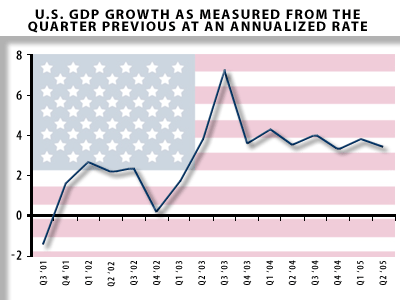
Gordon Brown will be Prime Minister of Britain within one year. The actual date is the stuff of opaque Westminster maneuvering, but the plan is for Tony Blair to leave 10 Downing Street before the end of 2007, so it is time to consider the man that will govern America’s closest ally until at least 2009. Brown is a Scottish member of parliament who has served as the Chancellor of the Exchequer for Britain since Blair took power in 1997. From that position Brown has held enormous sway over domestic policy, managing the budget and tax process. While Blair’s foreign policy has become enormously unpopular, with Iraq and Afghanistan both straining the resources of British armed forces, Britain has seen an uninterrupted period of economic growth and stability under Brown. Consider the growth trends in America in the last 5 years as compared to Britain, in the second chart: 
 Gordon Brown has managed to help maintain stability and growth in Britain even while raising some taxes and pouring large amounts of money into government spending to improve the NHS and other essential public services. Certainly his tenure has seen some controversies about efficiency of new spending and the tax credit system, and America’s growth is now at a higher rate than Britain’s, but after the ERM disaster and other economic problems under John Major and Margaret Thatcher what the British economy has seen under Brown has been a great improvement. Would Brown provide as effective leadership on foreign policy and other prime ministerial duties as he has on the economy? Many expect a major departure from many of Blair’s policies but this is far from certain. The reality is that Brown may be more “Euro-sceptic” and more pro-American than Blair. And that means something–if Blair has any real vision for Britain’s future (other than him hanging out with celebrities) it is Britain as a loyal, protected crony of America. Brown may decide that this deal has gone so far along that there is no point in trying to reverse it. One major benefit of Brown replacing Blair is that it might revive the Labour party in the polls. Brown is just as “New Labour” as Blair but he does not have the level of lost trust with the British people that Blair has suffered over Iraq. Many are tired of Blair’s constant moralizing and hype and spin. Clownish, authoritarian fear mongering and overzealousness and fealty to the Bush administration (like the infamous “forty-five minutes” and the shootings of Jean Charles de Menezes and Mohammed Abdul Kahar as well as the Downing Street Memo) has often gone too far and Brown may at least moderate that problem, perhaps simply to due to electoral considerations. His dour style also may not complement George W. Bush the way Blair does at media events. Labour has built a powerful electoral machine that has won three consecutive elections, and whatever other political reasons factored in, it is because they offer the best alternative for the British people. Gordon Brown should be a model to the Democrats as they try to build a sustainable and popular domestic platform to win the House and Senate back. [photo: AFP via Yahoo; chart of US GDP growth: web.stratfor.com; chart of Britain GDP growth (unlabeled): statistics.gov.uk]
Gordon Brown has managed to help maintain stability and growth in Britain even while raising some taxes and pouring large amounts of money into government spending to improve the NHS and other essential public services. Certainly his tenure has seen some controversies about efficiency of new spending and the tax credit system, and America’s growth is now at a higher rate than Britain’s, but after the ERM disaster and other economic problems under John Major and Margaret Thatcher what the British economy has seen under Brown has been a great improvement. Would Brown provide as effective leadership on foreign policy and other prime ministerial duties as he has on the economy? Many expect a major departure from many of Blair’s policies but this is far from certain. The reality is that Brown may be more “Euro-sceptic” and more pro-American than Blair. And that means something–if Blair has any real vision for Britain’s future (other than him hanging out with celebrities) it is Britain as a loyal, protected crony of America. Brown may decide that this deal has gone so far along that there is no point in trying to reverse it. One major benefit of Brown replacing Blair is that it might revive the Labour party in the polls. Brown is just as “New Labour” as Blair but he does not have the level of lost trust with the British people that Blair has suffered over Iraq. Many are tired of Blair’s constant moralizing and hype and spin. Clownish, authoritarian fear mongering and overzealousness and fealty to the Bush administration (like the infamous “forty-five minutes” and the shootings of Jean Charles de Menezes and Mohammed Abdul Kahar as well as the Downing Street Memo) has often gone too far and Brown may at least moderate that problem, perhaps simply to due to electoral considerations. His dour style also may not complement George W. Bush the way Blair does at media events. Labour has built a powerful electoral machine that has won three consecutive elections, and whatever other political reasons factored in, it is because they offer the best alternative for the British people. Gordon Brown should be a model to the Democrats as they try to build a sustainable and popular domestic platform to win the House and Senate back. [photo: AFP via Yahoo; chart of US GDP growth: web.stratfor.com; chart of Britain GDP growth (unlabeled): statistics.gov.uk]
Skip to content

